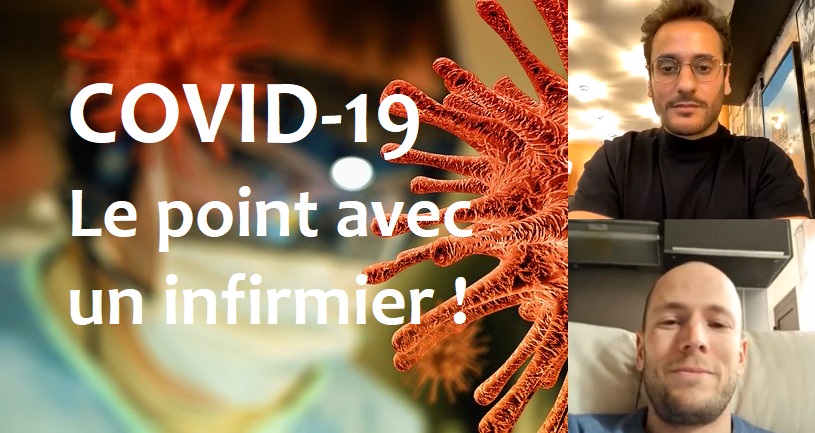I did a live chat with my friend Ben, a nurse, with whom I exchanged views on thehe health situation linked to the Covid-19 pandemic. He was able to give us some valuable advice, and we discussed a number of issues that are still unclear about the spread of this virus.
Table of contents
HideThanks to him for giving me some time off on his day off, and strength and honor to all the medical staff!
For those who don't have the time, here's a written summary of the video. Of course, some of the information is simply reflections, and some questions remain unanswered to this day!
What you need to know about COVID-19 infection:
- If you begin to experience complications after 6, 7 or 8 daysthat's when you need to be concerned, because it's generally after a whileand sometimes, after a little improvement, things can get really bad.
- There's no need to stress relaxto avoid damaging his immune system, and his general health at the moment.
- Transmission occurs mainly through asymptomatic individuals. (to others. So stop taking things so lightly because you've got nothing and you're feeling great. Think of others.
- Most infections are caused by infected surfaces by infected people. These surfaces then come into contact with uninfected people, who touch each other's eyes, etc. Ideally, therefore, we should wash your hands often and work psychologically on your tics (scratching eyes, hand in front of mouth, etc.).
- When we shop, we clean them or let them rest for a while. Wipes with bleach on packaging if necessary. And wash your hands before and after handling groceries.
- On the face of it, the virus can't be caught (or is unlikely to be caught) in the air when walking outside. A doubt persists concerning fine particles.
- Once cured, there's little chance of relapse, but it's unclear whether repeated exposure could overtax the immune system.
- It's best to be very careful when it comes to prevention.Even if it means being a stickler for hygiene and containment principles, too much is too much.
- Symptoms: fever, cough, diarrhea, loss of taste and smell.. Whatever the symptoms, call 15 in the event of respiratory distress.
- Tachycardia could be an indirect syndrome (linked to the rise in temperature, due to fever and flu), or related to anxiety.
- If you have a choice, confine yourself to the smallest possible number of people in the same household. If this is not possible, TAKE YOUR DISTANCES, even if it means being rude or irritable to your loved ones.
- Everyone has their own way of reacting to a particular virus. Don't believe you're invincible because we're in good general health, as too many parameters come into play.
- Don't hesitate to heating or cooking products before eating them, to increase the chances of "killing" viruses and bacteria.
- Cleaning well his living space regularly.
- Do not take any medication without medical support. For chloroquine, make sure you are supervised if you wish to take it, don't do anything.
- Respiratory assistance helps to overcome the fact that the lungs can no longer perform their function. It provides support until the disease passes, but the risk of not surviving is high. Some people are intubated for several weeks, with disastrous consequences in terms of rehabilitation.
- So coronavirus isn't just "the flu".
- Respiratory failure often occurs when the viral load has already fallen, so some doctors have deduced that the problem lies in the fact that the viral load has already fallen. immune response would be too strong. Others think it's the virus that attacks the pulmonary alveoli directly.
- Intensive care units are saturated, so of course you have to stay indoors.
- FFP2 masks should be donated to hospitalsand not worn in the street when jogging. Only high-risk professions should keep masks on, the rest of us don't need to wear them because we're sorely lacking in them.
- The short-term objective is to flatten the epidemic's progression curve, while waiting for research to come to fruition.
- We can't rule out a return of COVID-19 next year.
- Questions will have to be asked about public investment, which always comes too late, once deep-seated crises have set in (health, education, urban planning...). There is a real lack of planning among the world's decision-makers.
Thank you to the nursing staff. Stay at home, and remember the barrier gestures.
Don't forget to check out my other two posts about surviving in confinement:
Coronavirus: the list of low-carbohydrate foods for containment (LONG STORAGE!)

